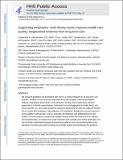| dc.contributor.author | Okechukwu, Cassandra A. | |
| dc.contributor.author | Kelly, Erin L. | |
| dc.contributor.author | Bacic, Janine | |
| dc.contributor.author | DePasquale, Nicole | |
| dc.contributor.author | Hurtado, David | |
| dc.contributor.author | Kossek, Ellen | |
| dc.contributor.author | Sembajwe, Grace | |
| dc.date.accessioned | 2017-09-07T14:56:37Z | |
| dc.date.available | 2017-09-07T14:56:37Z | |
| dc.date.issued | 2016-03 | |
| dc.date.submitted | 2016-03 | |
| dc.identifier.issn | 0277-9536 | |
| dc.identifier.uri | http://hdl.handle.net/1721.1/111142 | |
| dc.description.abstract | We analyzed qualitative and quantitative data from U.S.-based employees in 30 long-term care facilities. Analysis of semi-structured interviews from 154 managers informed quantitative analyses. Quantitative data include 1214 employees' scoring of their supervisors and their organizations on family supportiveness (individual scores and aggregated to facility level), and three outcomes: (1), care quality indicators assessed at facility level (n = 30) and collected monthly for six months after employees' data collection; (2), employees' dichotomous survey response on having additional off-site jobs; and (3), proportion of employees with additional jobs at each facility. Thematic analyses revealed that managers operate within the constraints of an industry that simultaneously: (a) employs low-wage employees with multiple work-family challenges, and (b) has firmly institutionalized goals of prioritizing quality of care and minimizing labor costs. Managers universally described providing work-family support and prioritizing care quality as antithetical to each other. Concerns surfaced that family-supportiveness encouraged employees to work additional jobs off-site, compromising care quality. Multivariable linear regression analysis of facility-level data revealed that higher family-supportive supervision was associated with significant decreases in residents' incidence of all pressure ulcers (−2.62%) and other injuries (−9.79%). Higher family-supportive organizational climate was associated with significant decreases in all falls (−17.94%) and falls with injuries (−7.57%). Managers' concerns about additional jobs were not entirely unwarranted: multivariable logistic regression of employee-level data revealed that among employees with children, having family-supportive supervision was associated with significantly higher likelihood of additional off-site jobs (RR 1.46, 95%CI 1.08–1.99), but family-supportive organizational climate was associated with lower likelihood (RR 0.76, 95%CI 0.59–0.99). However, proportion of workers with additional off-site jobs did not significantly predict care quality at facility levels. Although managers perceived providing work-family support and ensuring high care quality as conflicting goals, results suggest that family-supportiveness is associated with better care quality. | en_US |
| dc.language.iso | en_US | |
| dc.publisher | Elsevier | en_US |
| dc.relation.isversionof | http://dx.doi.org/10.1016/j.socscimed.2016.03.031 | en_US |
| dc.rights | Creative Commons Attribution-Noncommercial-Share Alike | en_US |
| dc.rights.uri | http://creativecommons.org/licenses/by-nc-sa/4.0/ | en_US |
| dc.source | Prof. Kelly via Shikha Sharma | en_US |
| dc.title | Supporting employees' work-family needs improves health care quality: Longitudinal evidence from long-term care | en_US |
| dc.type | Article | en_US |
| dc.identifier.citation | Okechukwu, Cassandra A., et al. “Supporting Employees’ Work-Family Needs Improves Health Care Quality: Longitudinal Evidence from Long-Term Care.” Social Science & Medicine 157 (May 2016): 111–119 © 2016 Elsevier Ltd | en_US |
| dc.contributor.department | Sloan School of Management | en_US |
| dc.contributor.mitauthor | Kelly, Erin L. | |
| dc.relation.journal | Social Science & Medicine | en_US |
| dc.eprint.version | Author's final manuscript | en_US |
| dc.type.uri | http://purl.org/eprint/type/JournalArticle | en_US |
| eprint.status | http://purl.org/eprint/status/PeerReviewed | en_US |
| dspace.orderedauthors | Okechukwu, Cassandra A.; Kelly, Erin L.; Bacic, Janine; DePasquale, Nicole; Hurtado, David; Kossek, Ellen; Sembajwe, Grace | en_US |
| dspace.embargo.terms | N | en_US |
| dc.identifier.orcid | https://orcid.org/0000-0003-2168-5611 | |
| mit.license | OPEN_ACCESS_POLICY | en_US |
| mit.metadata.status | Complete | |
